Transportation Secretary Elaine Chao defended the agency’s fiscal 2020 budget request, but also told a House subcommittee the Trump administration was prepared to work with the Democratic majority to development new bipartisan infrastructure legislation.
Chao said at the April 10 hearing called by the House Subcommittee on Transportation, Housing and Urban Development that DOT”s $84 billion budget request “continues to emphasize the importance of addressing our nation’s infrastructure needs using smart, effective and modern methods that provide results and maximize our resources.”
However, Rep. David Price (D-NC), chairman of the subcommittee, expressed disappointment with Trump administration, saying they have failed to present “anything resembling a realistic plan.”
Trucking-focused topics were left mostly untouched during the hearing, including the status of the hours-of-service rule. Late last month, Chao confirmed the Federal Motor Carrier Safety Administration was moving forward with a notice of proposed rulemaking aimed at creating more HOS flexibility.
Several congressmen quizzed Chao on the Federal Aviation Administration’s oversight as Boeing works to fix the software blamed for two recently deadly 737 Max 8 plane crashes.
That led to related questions how government and industry should best work together to ensure the safety of emerging technologies, including automated vehicles.
In her opening comments, Chao touted that the budget request included nearly $300 million to address “emerging technologies and innovation.” There is also $19.2 million in the National Highway Traffic Safety Administration’s budget to oversee the introduction of automated driving systems, she said.
One point of contention during the generally cordial hearing was a perceived slight in infrastructure funding between rural and urban areas.
Chao stated she believed the Obama administration had prioritized urban projects, and current grant efforts were an attempt “to be fair” to rural communities, which suffer from a disproportionate number of vehicular accidents.
One particular project repeatedly discussed was the Gateway project, meant to provide an improved rail transit link between New York and New Jersey.
There were disagreements on the status of the environmental impact statement, and reasons why the priority level for federal funding was lowered.
Though this particular project does not have any immediate impact on truckers, it served as an example of the division between Democrats and Republicans that could extinguish any hope for bipartisan infrastructure funding legislation during 2019.
In looking at the overall budget request, Chao pointed out 75% is to fully fund surface transportation for the final year of the Fixing America’s Surface Transportation (FAST) Act and for Federal Aviation Administration programs.
“These programs support infrastructure improvements that are critical to maintaining dependable transportation systems that support our growing economy,” she said.
About the Author
Neil Abt
Neil Abt is a former FleetOwner editor who wrote for the publication from 2017 to 2020. He was editorial director from 2018 to 2020.
